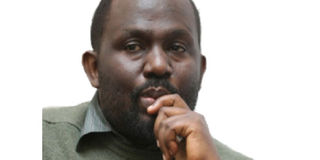I smell future sports glory for Uganda in the air

The IAAF World Championships ended in London Sunday, and Uganda came off with only one silver, via the legs of Joshua Kiprui Cheptegei in the 10,000 metres. Yet, I think it was Uganda’s best athletics appearance on the world stage since the days of Idi Amin.
Though the women didn’t win anything, I don’t remember there has been a time over this period when there were as many of them running in Ugandan colours as in the London World Championship, despite their being only a handful (we are not counting the Commonwealth Games here).
So what is happening? It’s possible we are seeing the results of the “Kiprotich Effect”, following Stephen Kiprotich’s sensational marathon gold medal in the London 2012 Olympics, when he ended the country’s 40-year gold drought at the Games. These things have a demonstration effect, with Kip’s glory making other young people see that their dreams and hard work can become possible.
We should also not underestimate the impact of the Cranes qualifying for the last Africa Cup of Nations, although they didn’t travel far in the tournament.
These things create a cloud of possibilities, but a few other things also need to happen.
For starters, I sense that there might be an opening in the East African middle and long distance running market. It seems Ethiopia is wobbling, and is producing fewer and fewer dominant athletes.
In the East African Community, Uganda seems to be churning out runners more than Tanzania, Rwanda, or Burundi, in total numbers.
You could say the country is on a mini roll. Part of it is that the Sebei area, from where most of our winning stars come from, is in the same Rift Valley belt that stretches to the eastern part of the Republic. In the Rift Valley, kids wake up early and run before they go to the well or to school. Their ears are full of stories of other children from their villages who made it big, and they all want a piece of the action.
Now Kenya has at least seven training camps and centres, where athletes from allover the world come to train.
A whole economy has developed around these camps, and it’s lucrative business. For them to work, you need a good number of quality runners who can be training partners. We are beginning to get there.
And, of course, the camps need to be in the right places, ie at high altitude somewhere in Sebei.
The government should stay away; this is stuff for private investors…so there. Perhaps the government can concession an international sports training centre, and grant land for it. But for heaven’s sake, it should not try to run it.
If it were done, which rich long distance runner in the world would not write a cheque to come and train with Kip somewhere on the slopes of Mt Elgon?
For its part, the government and sporting authorities should bring more events like the IAAF World Cross Country Championships that took place in Kololo in March.
Seeing in the flesh glamorous and world-beating athletes whom they had only watched on TV fires up young – and old - minds.
But the rest of what is needed has nothing to do with sports.
I think the biggest explanation for the rise of world-beating African athletes in recent years is economic reforms.
Once very closed economies (like Ethiopia) begun to open up, removed currency controls, and allowed citizens to open foreign currency accounts at home, many good sportsmen and women who could win on the world stage were now motivated to go out and run for money, knowing the State wouldn’t confiscate it, nor would it be squirrelled away through rigged exchange rates set by bureaucrats.
The other second change was the increased ease of obtaining passports.
In the past, passports were the privilege of a few, so good athletes couldn’t travel to compete. All these kids who run well on school sports days should get East African passports and be dispatched to run in marathons in the region.
Third, is the Internet. It has allowed talented athletes to gain knowledge far beyond that available locally on training and races. Kenyan runners, for example, now travel to Nigeria to clean out the Lagos marathon. How would they have known that there’s a marathon in Lagos?
Fourth is television, especially pay services like DSTv, that air a lot of international sports.
These days you win the Kampala marathon, and the whole of Africa - and the world - sees you pulling it off, and immediately there is global interest from sports managers and brands.
Doing more of these things well could unlock sports glory for Uganda again.
Surely, it cannot be that since Akii Bua, Abako has not produced another son or daughter with his racing genes.
Mr Onyango-Obbo is the publisher of Africadata
visualiser Africapedia.com and explainer site Roguechiefs.com. Twitter@cobbo3




